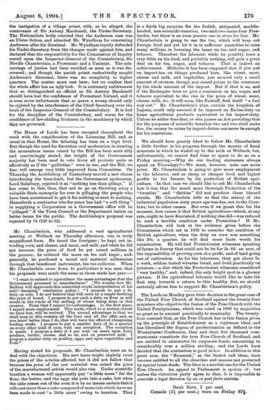We should have greatly liked to follow Mr. Chamberlain a
little further in his progress through the morass of fiscal nonsense in which he waded up to the neck at Welbeck, but, unfortunately, we cannot find time or space to do • so on a Friday morning.—Why do our leading statesmen always speak on Thursdays P—We must, however, note one more. point. Mr. Chamberlain is going to give more employment. to the labourer, and as cheap or cheaper food, and higher' profits to the farmer, by his protection of British agri- culture. • In that case we should like to ask Mr. Chamberlain how it was that the much more thorough Protection of the, " twenties " and "thirties " did not produce these blessed. results. Mr. Chamberlain tells us that the misery of the industrial population sixty years ago was due, not to the Corn- laws, but to other causes. But even if we grant this for the moment, how comes it that British agriculture—which, at any rate, ought to have flourished, if nothing else did—was reduced to such a terrible condition under Protection P If Mr. Chamberlain will look at the evidence given before thee Commission which sat in 1836 to consider the condition of British agriculture, when the duty on corn was something like 30s. a quarter, he will find some facts worth • his examination. He will find Protectionist witnesses speaking of farms in Surrey that could not be let for 2s. 6d. an acre, of, the impossibility of growing corn at a profit, and of land going out of cultivation. As for the labourers, they got about' 7s: a week, seldom tasted wheaten bread, and lived practically on potatoes,—a diet which the Protectionist witnesses considered' "very healthy," and, indeed, the only bright spot in a gloomy picture. If the agricultural labourer would like to take the first step towards a return to this healthy diet, we should certainly advise him to support Mr. Chamberlain's policy.






































 Previous page
Previous page